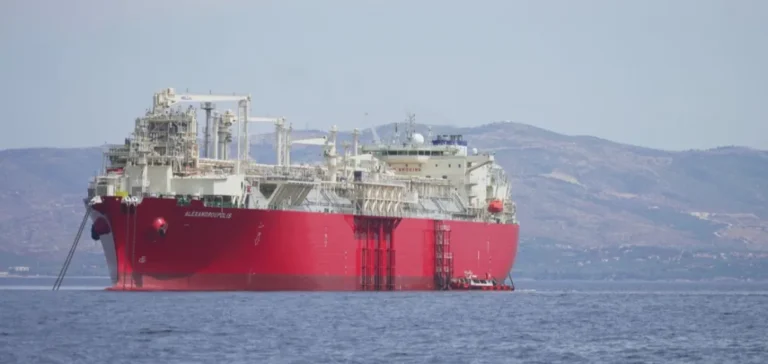The Floating Storage and Regasification Unit (FSRU) of Alexandroupolis, located in northeastern Greece, has resumed operations after nearly six months of complete shutdown. The interruption, triggered in late January 2025 by a failure in its booster pumps, required the replacement of critical equipment and several phases of technical testing. Operated by Gastrade, the FSRU will operate until September 30 at 45.4 GWh/day — 25% of its nominal capacity of 5.5 billion cubic meters (Bcm) per year — before a planned return to full capacity on October 1, 2025, marking the start of the new gas year.
A technical incident with a shifting timeline
The breakdown was initially assessed as repairable within two months, with a restart expected by late March. However, the complexity of the work and supply chain delays for spare parts pushed the target date first to May, then to mid-August. The 153,500 m³ unit, equipped with ship-to-ship (STS) loading arms and two redundant regasification trains, underwent a full inspection of its high-pressure circuits and a recalibration of pumping systems.
Commissioned for commercial service in October 2024 after its first cargo in February of the same year, the terminal handled four cargoes — one each month from October to January — totaling around 1.03 terawatt-hours (TWh) of regasified gas before the shutdown.
Saturated capacity and long-term contracts
Fourteen Greek and international players have booked capacity at the terminal, covering almost all available volumes until 2030. Among them, Venture Global LNG holds a firm contract for 25% of the annual capacity starting in 2025, while regional groups such as DEPA Commercial and Bulgartransgaz, a 20% shareholder, secure volumes for domestic markets and exports. The contractual structure is largely based on multi-year Terminal Use Agreements (TUA), limiting access to spot capacity.
A key link in regional interconnections
Connected to the national grid operated by DESFA (Hellenic Gas Transmission System Operator), Alexandroupolis can inject gas to the Sidirokastro delivery point, linked to the Interconnector Greece–Bulgaria (IGB). This pipeline, operated by ICGB, currently transports 3 Bcm/year and is set to increase to 5 Bcm/year following an expansion authorized in early August 2025. This capacity boost will coincide with the FSRU’s return to full load, enhancing export potential to Bulgaria, Romania, and Serbia.
According to DESFA data, Greece’s total injection capacity will then exceed domestic demand, creating a structural surplus available for regional exports. Flows via Revithoussa — the other Greek, land-based terminal — have already partially compensated for Alexandroupolis’ outage, but the floating infrastructure remains essential for diversifying entry points and reducing congestion.
Market context and outlook
The Alexandroupolis restart comes in a European gas environment marked by declining Russian imports and an increase in LNG entry points. Spot prices delivered to the Eastern Mediterranean (DES East Med) are hovering around $10–$11/MMBtu, reflecting a balanced market but one sensitive to seasonal fluctuations. The addition of extra capacity in the fourth quarter could influence flow distribution in Southeast Europe, especially during peak winter demand.
Prospects for 2026 include increased use of the FSRU’s capacity for exports to third markets, supported by the flexibility of its unloading system and the firm contractual commitments already in place. The combination of Alexandroupolis with other Greek infrastructure strengthens the country’s role as a regional transit platform, while maintaining commercial optimization potential for unallocated spot volumes.






















